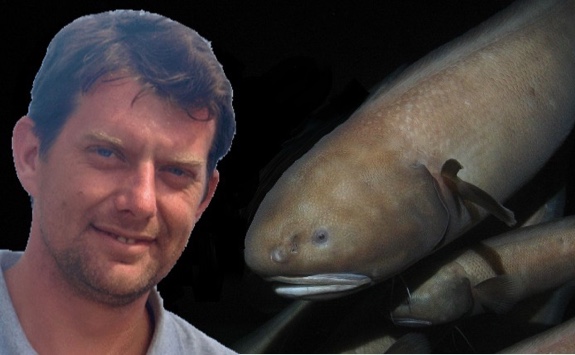Dr Alan Jamieson
Senior Lecturer in Marine Ecology.
Alan Jamieson and his colleagues really do go where no marine biologist has gone before.
They explore the deepest ocean environments – known as the hadal zone. They look more than 6,000 metres below the surface.
Most of these deep trenches are in the Pacific Rim. Even at this depth, the sea teems with life.
The team has become almost blasé about the number of new species they have identified.

We recently filmed the deepest known fish in the world, seven miles down. We must have discovered more than six new species of fish, maybe 10 or more different crustaceans.
Exciting new discoveries in the depths
Alan said: “We recently filmed the deepest known fish in the world, seven miles down. We must have discovered more than six new species of fish, maybe 10 or more different crustaceans."
Making so many exciting new discoveries makes life interesting for the scientist. But what is the rationale for this kind of research?
Alan doesn’t deny that important drivers are:
- pure curiosity about this unknown part of the globe
- the potential for finding unknown species
But he is also clear about the importance of the science.
Half a planet of deep ocean to explore
Alan said: “When I’m teaching, I always show students the Google Earth image of the Pacific Ocean. There is hardly any land there – Hawaii and small slivers of New Zealand.
"That’s half of our planet and most of that one body of water is about 4,000 metres deep. The deep ocean is the largest living space on Earth.
"We know so little about it, it’s daunting to see how unexplored it is. But there are animals living there and they perform important ecological functions.
"Most of our efforts at good stewardship focus on the top 100 metres of water. But if we are to understand how it works, we have to build a better knowledge of the whole ecosystem.”
Falling into marine biology
But Alan didn’t set out to be a marine biologist. His undergraduate degree was in industrial design.
But during his course he designed an underwater vehicle. After graduation, this led him to the University of Aberdeen and a deep sea research group.
His expertise in designing technology for this work prompted him to do a Masters. That quickly morphed into a PhD.
Alan said: “We were working on finding a way to capture fish at depth and measure their oxygen consumption. These are species that wouldn’t survive coming to the surface.
“Videos and observations of fish behaviour proved more interesting than our original research. They resulted in more publications.
"Once I completed my PhD, it was a case of 'where’s the deepest place in the ocean? Let’s go and look!'
"That involved building the first two ultra deep cameras. We blagged our way onto Japanese and German research vessels. I found myself doing the marine biology as well as technical stuff.
"That’s how I ended up as a marine biologist. It wasn’t what I had expected to be doing when I embarked on my original degree.”
We spend a lot of time going out on expeditions, which is always an adventure and fun. - Dr Alan Jamieson
It's not all glamour
It’s not such an unusual start in a science:
- that draws in skills from a range of different disciplines
- where everyone will be lending a hand during research trips
There is a lot of travel involved, with television and media coverage. But Alan says it’s not all glamour.
He said: “We spend a lot of time going out on expeditions, which is always an adventure and fun. We do tend to be landing at some remote harbour, way off the beaten track.
"And our work does attract a lot of attention. Our footage of the deepest part of the ocean appeared on the recent Blue Planet series.
Not keen on 'piling on the guilt'
"It’s a pity so much of what we see on TV focuses on how we are destroying the planet. If we pile on the guilt it can make viewers simply turn off.
"There are so many positive stories to tell and so much still to discover. It’s important to talk about that too.
"It's vital to keep everyone interested in these undiscovered parts of our world.”
